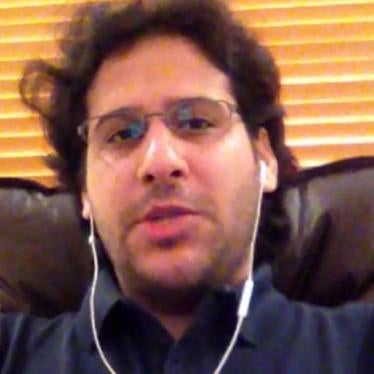(Beirut) – Saudi authorities detained Zuhair Kutbi, a prominent writer and commentator, on July 15, 2015, following a TV interview in which he discussed his ideas for peaceful reform. Authorities apparently questioned him about his television appearance, which had attracted considerable attention on social media.
Saudi authorities have been holding Kutbi, 62, a Mecca-based writer and commentator, apparently without charge, and have not brought him before a judge. Authorities should charge Kutbi with a recognizable crime or release him immediately, Human Rights Watch said.
“Saudi authorities apparently have little better to do than to harass and jail people for nothing other than peacefully expressing their opinions,” said Joe Stork, deputy Middle East director. “It’s time for King Salman to put an end to this escalating repression and release all peaceful activists and writers.”
Kutbi formerly worked as a consultant with the local Mecca municipality. His writings over the years resulted in at least six previous arrests, Saudi activists told Human Rights Watch.
A member of Kutbi’s family told Human Rights Watch that his latest arrest followed an hour-long appearance on the television program Fi al-Sameem (In-Depth), which aired on June 22 on the pan-Arab satellite TV channel Rotana Khaleejia. During the interview, Kutbi spoke about what he regarded as necessary reforms in Saudi Arabia, including transforming the country into a constitutional monarchy and combatting religious and political repression.
The authorities had temporarily suspended the program earlier in June after another guest, Mohsen al-`Awajy, an Islamist activist, indirectly criticized the late King Abdullah.
The family member said that on the morning of July 15, six black SUVs carrying at least nine security officers wearing masks arrived at Kutbi’s home in Mecca. As the officers took Kutbi away, the family member said, they hit him on his back with their rifles. They took him first to an unknown detention center in Mecca for interrogation, and then moved him to Thahban prison in Jeddah for a day. On the third day, they transported him to al-Mansour Police Station for further interrogation, and over the next eight days moved him between three detention centers in Mecca.
The family member said that Kutbi suffers from various illnesses including hypertension and diabetes, and that he is still recovering from an operation for prostate cancer earlier this year. He has been able to receive his limited medication in prison, but has not received independent medical attention despite the family’s requests.
The family member said that Kutbi told other family members who visited him in jail that investigators suggested that they may charge him with inciting public opinion, insulting the judiciary, or offending symbols of the state.
On the day of Kutbi’s arrest, an article appeared on the Sabq news website stating that authorities had banned Kutbi from media appearances and would put him on trial for statements he had allegedly made about the late King Sa`ud. Kutbi’s family member denied that he had ever made such comments. Kutbi mentioned in the same TV interview that King Sa`ud was the first Saudi monarch to propose a constitutional monarchy but was later forced out of power.
Kutbi is the latest in a string of activists and political commentators who have been jailed for peacefully expressing their political, social, and religious views.
Authorities generally bring catch-all charges designed to criminalize peaceful dissent, such as “breaking allegiance with the ruler” and vague provisions of a 2007 cybercrime law. The activists include Waleed Abu al-Khair and Fadhil al-Manasif, both serving 15-year prison terms for their peaceful human rights work, and Fowzan al-Harbi, whose sentence in an appeals court was increased from 7 to 10 years in November 2014.
Extended detention without charge or trial or without an appearance before a judge is arbitrary, and violates international human rights standards.
Human Rights Watch wrote to Interior Minister Mohammad bin Nayef on September 23, 2014, urging him to put an end to arbitrary detention. A 2014 analysis of Saudi Arabia’s online prisoner database revealed that 293 people had apparently been held in pretrial detention for over six months without the cases being referred to the judiciary. Sixteen of them had apparently been held for over 2 years, one for over 10 years.
Article 114 of Saudi Arabia’s Law of Criminal Procedure (LCP) provides that a person may be detained without charge for a maximum of five days, renewable up to a total of six months by an order from the Bureau of Investigation and Prosecution. After six months, article 114 requires that a detainee “be directly transferred to the competent court, or be released.”
The United Nations Working Group on Arbitrary Detention has determined that detention is arbitrary when the detaining authority fails to observe, wholly or in part, the norms related to the right to due process, including for a prompt hearing before a judge following the initial detention. Principle 11 of the UN Body of Principles for the Protection of All Persons under Any Form of Detention or Imprisonment states that a detainee must be “given an effective opportunity to be heard promptly by a judicial or other authority,” and that a judicial or other authority should be empowered to review the decision to continue detention.
The Arab Charter on Human Rights, which Saudi Arabia ratified in 2009, also guarantees the right of anyone arrested or detained on a criminal charge to be brought promptly before a judge or other officer of the law, and to have a trial within a reasonable time or be released. The charter says that “Pre-trial detention shall in no case be the general rule.”
“If there is no evidence of criminal behavior, the Saudi authorities should immediately release Kutbi and compensate him for the ordeal they have put him through,” Stork said.







